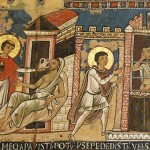We run our website the way we wished the whole internet worked: we provide high quality original content with no ads. We are funded solely by your direct support. Please consider supporting this project.

Where Psychology and Theology Meet
Guest post by Ty Gibson
The biblical narrative reveals that God bears our guilt—not merely in the penal sense that Reformed theology asserts—but in the sense that He bears our misconceptions of His character as we project our sins upon Him. To the degree that fallen human beings find it psychologically impossible to bear the revelation of themselves, which they would be obliged to face if God were to assert His complete innocence, He allows them to attribute to Him their own ugly characteristics.
The dark mental enterprise is encapsulated in God’s penetrating diagnostic question to Job:
“Would you condemn Me that you may be justified?” (Job 40:8).
Here God puts His finger on our most sensitive nerve. We blame God as a self-justification maneuver. The guilty conscience possesses an impulse to fabricate an image of God that resembles ourselves in order to evade the shame His perfect goodness would thrust upon us if we were to allow ourselves to be confronted by it in one quantum leap of consciousness. “If God is like me,” we subconsciously reason, “then I need not be any different than I am, and I need not feel guilty for the way I am.” My actions and attitudes are justified by attributing them to God.
“These things you have done, and I kept silent; you thought that I was altogether like you; but I will rebuke you, and set them in order before your eyes” (Psalm 50:21).
At one stage of the relational dynamic between God and fallen humans there is a necessary silence on God’s part, lest we be devastated by the truth of our shame. But His silence is not indefinite. He will “rebuke” us and set things in order before our eyes, but only as we can endure the truth and be healed rather than destroyed by its revelations. God relates to us with one foot on the throttle and one foot on the break, which is to say, He mingles merciful silence with measured disclosure. He refrains from asserting His righteousness—thus submitting Himself to suffer under our distorted perceptions of Him—to the degree that our fragile egos require His silence, and yet He will gradually set our sins before us and vindicate His innocence. And this, I suggest, is God’s fundamental MO throughout the biblical narrative.
Theology—our systemized doctrinal picture of God’s character—is the primary realm of our quest to evade our guilt. To the degree that we are able to formulate theological constructs that attribute dominance, arbitrariness, and violence to God, we are afforded emotional release and psychological refuge from the shame of our dominance, arbitrariness, and violence. Said another way, there is a subconscious logic of blame and evasion that undergirds all false doctrine. Part of the sin problem is that we formulate pictures of God that justify our cruelty and injustice toward one another.
Determinism is the most prominent and pervasive escape mechanism we humans have devised, showing up in nearly every worldview. It allows us to shift responsibility for evil from ourselves to God under the pretext that all events and outcomes are the will of God. Quite simply, the most dysfunctionally cathartic location to place the responsibility for evil is upon God.
Why?
Because God presents the greatest potential threat to our psycho edifice of evaded shame.
Determinism is a “sophisticated” form of blame-casting that has God as its target while passing for God-honoring theology. It not only allows us to believe that God is the cause of all the evil for which we cannot bear to accept responsibility, it also allows us to simultaneously feel that God is being honored for His sovereignty over all things, including all the evil that bludgeons our world. In other words, deterministic theism doesn’t overtly blame God for evil, rather it is a subconscious form of blame-casting that we pass off as theological correctness. The dark psychological secret that hides beneath the surface of determinism is that our guilt is so horrific that we cannot bear to believe that God is not responsible for all outcomes. So in the face of evil, we chant mantras like,
“God is in control.”
“Everything happens for a reason.”
“God has a plan.”
“God knows best.”
“God is trying to teach us something.”
Each line is a line of defense against the guilt that lurks just beneath the surface of our consciousness.
We need to believe that “God is in control.”
Why?
Because we sense that if God is not in control, well, then, it is we who are to blame for the horrors that haunt and hurt our world. Attributing to God the tragedies that torment our world acts as a psychological buffer to hide the fact that we are responsible, that all the suffering that crushes the human race is the direct result of our own violations. Determinism is a theological drug used by religious people for the same purpose street drugs are often used by the non-religious—to evade guilt, to suppress shame, to skirt repentance.
Similarly, the doctrine of eternal torment serves as a psychological refuge from the darkest features of our sinfulness. Eternal torment allows us to believe the worst of God while feigning reverence for Him. As long as we conceive of the punishment for sin as God arbitrarily inflicting torture, we don’t need to travel the harrowing psychological ground toward the realization that it is our sin itself, and the guilt that adheres to it, that imposes the penalty upon us.
All false theologies constitute some form of blame-casting, each one an attempt to evade our shame, each one an effort to construct a survival mechanism that passes for salvific necessity. In this sense, religion is the best place in the world to hide from God. To the degree that we can make ourselves believe that God is arbitrary in character and therefore that reality it is arbitrary in nature, we are subconsciously released from responsibility for evil and the horrific pain that adheres to it.
By logical extension, Scripture, too, is an advantageous place to hide from God if we can interpret it in such a way as to serve our need to project our guilt onto God. And yet—wonder of wonders—in His infinite love, God has actually provided Scripture for us in a form that allows us to evade Him while approaching Him. God suffers under our theological lies as a necessary aspect of bearing our sin in order to save us.
If God were to have given us a sacred text that contained no possibility of casting Him in a false light, that revelation would equate to God forcing upon us the complete truth about ourselves in one quantum leap of consciousness that would crush us. Rather, by God’s grace, Scripture is formulated in such a manner that the truth of God’s innocence, and the realization of our corresponding guilt, may be accessed by degrees, in developmental phases, as a kind of gradual healing therapy that allows us to face ourselves as fast as we can bear it, while God graciously bears our false beliefs about Him along the way to the degree that we need Him to.
Jesus got at this relational principle when He said, “I still have many things to say to you, but you cannot bear them now” (John 16:12). It is axiomatic to this statement that whatever those things are that we can’t bear, His withholding of them necessitates that He bear them for us by allowing us to believe things about Him that are untrue. He suffers under the weight of the falsehoods we hold about Him because He knows that to rip the dagger immediately from our chest would be fatal.
Later, in this same address Jesus explained to His disciples the revelatory process He is employing in His dealings with humanity, and He defined the ultimate end to which that process is reaching:
“These things I have spoken to you in figurative language; but the time is coming when I will no longer speak to you in figurative language, but I will tell you plainly about the Father. In that day you will ask in My name, and I do not say to you that I shall pray the Father for you; for the Father Himself loves you” (John 16:25-27).
His point is clear: we can only handle the truth in veiled form, in the form of figurative language. So that’s how He approaches us. Oddly enough, or not so oddly after all, the ultimate truth to which all the figurative language points, the truth that we cannot immediately bear in full force, is the fact that “the Father Himself loves [us].” Jesus here explains that He is acting in a mediatory role necessitated by our fallen condition. But He would have us understand that the day is coming in which He will have sufficiently enlightened us to the point that His mediation will be unnecessary. He remains in relationship with us by allowing the false conceptions of God we harbor in our hearts to block our perception of the Father’s love. This explains why, throughout Scripture, God is said to do horrific things for which we are actually responsible. The Bible often says that God did things that He merely allowed us to do. We find it easier to frame reality with Him in absolute control rather than trace the threads of evil to our own actions and culpability.
Along these same lines, in 1 Corinthians 13, Paul unpacks the progressive revelatory nature of love’s consciousness-inducing effect. After poetically delineating the relationally flawless beauty of love, he states:
“For we know in part and we prophesy in part. But when that which is perfect has come, then that which is in part will be done away. When I was a child, I spoke as a child, I understood as a child, I thought as a child; but when I became a man, I put away childish things. For now we see in a mirror, dimly, but then face to face. Now I know in part, but then I shall know just as I also am known” (1 Corinthians 13:9-12).
Not only do we humans in general know in part, viewing things through the dark veil imposed by our guilt, but even our prophesying, our inspired text, is partial. But there is a perfection of unveiled perception coming our way that will transcend our partial prophesying, and that perfection of unveiled perception is present in Christ, reaching its zenith of clarity at the cross. Prior to the point at which the revelation of God in Christ penetrates us to our depths, we speak and think theologically as children. Putting away childish pictures of God—childish theologies—requires an unveiled encounter with God’s perfect love in Christ. It is by embracing the revelation of the Father in Christ that we become mentally and emotionally situated to know ourselves as we really are, without the interposing veil between, without running to our false theological constructs for refuge from our guilt. Within the healing light of His love, we gradually find the honesty to face ourselves.
I once saw God, as through a window I peered;
He was just as I suspected, just as I feared.
So selfish and cruel He appeared to be;
So very ugly, so unlike me.
Then I looked deeper, still deeper with time;
T’was a mirror all along, and the image was mine.
Photo via Visual Hunt
Category: General
Tags: Cruciform Theology, God's Character, Guilt, Love, Sin
Topics: Attributes and Character
Related Reading

The Call to a Cruciform Life
Jesus repeatedly taught that following him meant that one had to be willing to “pick up their cross daily and follow [him]” (Lk 9:23; 14:27). Picking up our cross is the centerpiece of following Jesus because this was the centerpiece of what Jesus was all about. The thematic centrality of the cross is also illustrated…

God’s Church is Not “Pretty”
This week we’ve been looking at various aspects of what it means to be the church. Today, I want to address the paradox of how the church can be both beautiful and ugly at the same time. Jesus came into our fractured world to manifest the beauty of God’s reign and revolt against the evil…

Sin-Bearing God
On the cross, God became our sin, as Paul wrote: “God made him who had no sin to be sin for us” (2 Cor 5:21). However, God didn’t begin to be a sin-bearing God when Jesus walked the earth and hung on the cross. Rather he became Incarnate and bore our sins on the cross…

Podcast: Does the Cruciform Hermeneutic Sabotage Open Theism?
Greg plays Peek-a-Boo with God and considers whether those verses Open Theists use to support Open Theism might simply be times when God is accommodating for us. http://traffic.libsyn.com/askgregboyd/Episode_0236.mp3

Confronting the Divine Montage
The superiority of Jesus’ revelation over a montage view of God (see previous post) is captured when Paul and the author of Hebrews utilize an analogy of a shadow verses reality. Paul instructs his disciples not to “let anyone judge you by what you eat or drink, or with regard to a religious festival, a…

Love Conquers All
Paul prayed in this way for the church at Ephesus: I pray that, according to the riches of his glory, [God] may grant that you may be strengthened in your inner being with power through his Spirit, and that Christ may dwell in your hearts through faith, as you are being rooted and grounded in…
